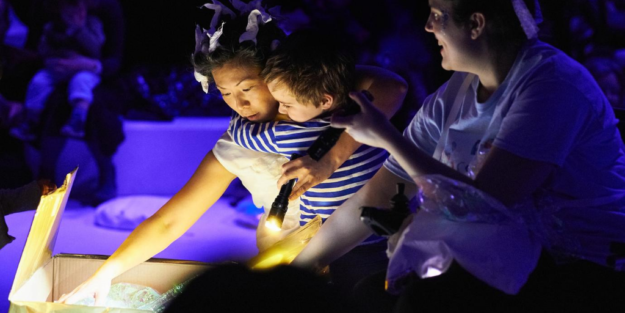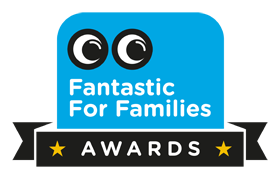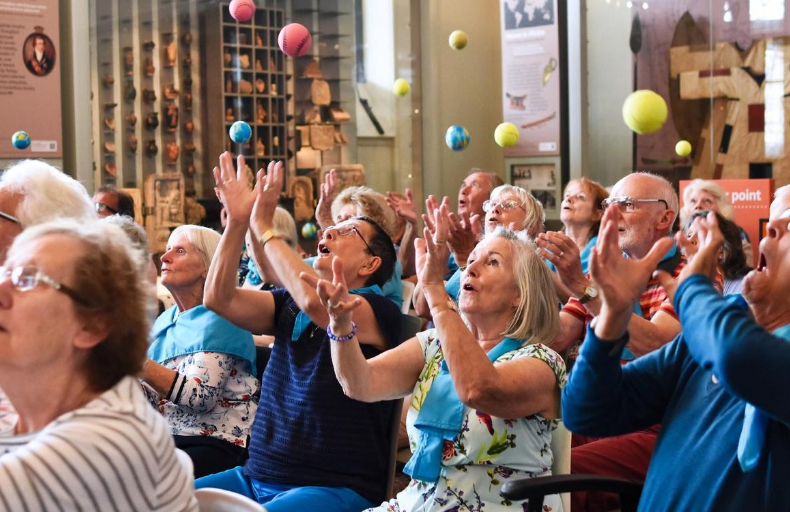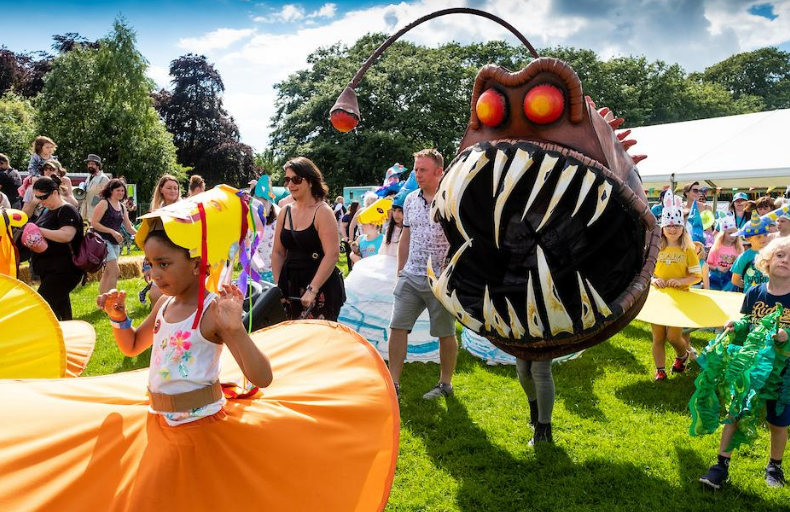Fantastic for Families Award 2020 nomination
Oily Cart:
Integrating disabled and non-disabled children and families as audiences
Oily Cart is one of the shortlisted organisations for this year’s Audience Impact Award. Here they talk us through their new, inclusive formats for theatre shows, to integrate disabled and non-disabled children and families as audiences.
For nearly 40 years Oily Cart have been making shows for young children and families who have the most barriers to access, and so are most invisible in society and least catered for: those labelled as having profound and multiple learning disabilities. Striving to be genuinely engaging for these young people, who experience the world in a sensory way, rather than through verbal language, has led us to completely rip up the rule book of standard theatre! We have explored many different formats, all of which are highly flexible and responsive to who is in the room with us and their reactions to the work.
Our priority is the dignity for each audience member, so we will never do anything that is not genuinely relevant, or engaging to the families we meet. However, because of this very specialised way of working, we have, in the past had small audience numbers, sometimes even one family at a time in our shows. While this provides a very safe space, that truly celebrates that family’s way of being in the world, we could see that this did mean there were limited opportunities for integration with non-disabled children and families.
This has made us experiment with two strands of work in the last year – we are now offering both:
- Focused shows, for young people who need more space, extra processing time and more one to one contact to engage fully with a piece.
- Inclusive shows, which are made thinking about people with the most barriers first in the creative process, but then open to all.

By offering these two strands of work, we feel that we can offer our audiences more choice and deepen their connection and ways of engaging with our work. It means we are hopefully never making assumptions that ‘one size fits all’.
In trialing this new inclusive format, we have learnt a lot along the way, and expect to keep learning. To find a way of genuinely including everyone is an amazing aspiration, but very difficult to achieve. Here are some considerations we would offer to artists making similar attempts:
- Always think of those with the most barriers first in the process, but make sure there is enough to hold the theatre experience for everyone. The more engaged the adults are, the more interesting the children will find it
- Some access needs come into conflict with each other – for example, some people need high intensity sensory input like loud, vibrating sound sources, to engage, while others are sound sensitive. Try to build in ways people can control their sensory input during a show. This should include options of making things heavier, louder and higher intensity.
- Make sure you always provide thorough and creative preparation materials such as social stories, and a quiet space at every venue. This is not an add on but essential for some people to be able to enjoy and access a show.
- There will always be some people who cannot make it to the show on that day, in that place, at that time – ideally you would have an online or at home version that is of equal quality, so these families do not miss out (especially now as many are still shielding).
A huge learning for us has been about the importance of representation on stage, and behind the scenes. It is one thing to make your shows accessible to diverse audiences… but what about your creative process and who is on stage?
There is a saying that children need mirrors and windows… to see themselves reflected in society, and ways of seeing beyond their experiences to see other perspectives and more possibilities. I feel our first inclusive show ‘All Wrapped Up’ was successful in that. Here is a quote from one parent who came with her disabled daughter:
“It was particularly nice to see a performer in a wheelchair as not only can Lucy see others using them but non-SEND families experience this too and it helps break down barriers… We were the only SEND family there as far as I could tell which usually would make me nervous but everyone was so friendly”.
Being nominated for this award means a lot to us, as it’s not just about our artistic work being acknowledged, but about all the diverse, creative, resilient young people and families we work for and with being acknowledged as the amazing audiences and artists that they are. They deserve to be participating in work of the highest quality. To be thought of first, not last in arts and activities.
21 August 2020
FURTHER INFORMATION

Ellie Griffiths is Artistic Director of Oily Cart
Ellie Griffiths and Zoe Lally are joint CEOs of Oily Cart. Oily Cart make inclusive, sensory shows using touch, smells, sounds, taste, colours, live music, lights, and movement. Their pioneering shows have had their family audiences bouncing on trampolines, floating in water and even flying up in the air!





